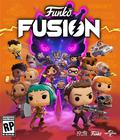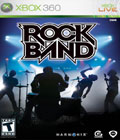Genre: Rhythm/Music
Publisher: MTV Games
Developer: Harmonix
Release Date: November 20, 2007
Harmonix's Rock Band for PlayStation 3, with the addition of drums and score-accumulating, star-rated vocals to lead and bass guitar, is the natural progression of the popular, critical-darling Guitar Hero (GH) franchise the studio created. At present, with separate instruments not yet available, the game is best acquired in a bundle that, though hardly inexpensive, is overall a good value. The bundle includes the Rock Band game; a drum controller that looks, and more or less behaves, like a MIDI drum-pad kit; a guitar controller modeled after perhaps the most recognizable name in electric guitars, the Fender Stratocaster; and a high-quality Logitech-manufactured USB microphone.
Despite new music content, some graphical changes in presentation and in the depiction of "notes," scrolling down on-screen tracks — notes you are intended to play at the right moments to keep the rock rolling — the basic design model differs little from the well-established Guitar Hero games. No big surprises here, but I wouldn't mess with a proven formula, either.
The guitar parts behave as you'd expect if you've ever played a GH title or even just shoulder-surfed some deaf, dumb and blind kid deftly mastering one of these games at a demo kiosk in an electronics superstore. The Rock Band Strat does include some high fret buttons — smaller buttons located much closer to the base of the guitar — useful for ripping out score-boosting freestyles that frequently grace the final passages of included music content; the thinner, more closely spaced buttons are also a nice compromise for children or anyone with limited reach, for whom the larger, low fret buttons require a lot of hand repositioning or other workaround struggles. The "strum bar" on the Strat also has a different feel than the more familiar button-esque click of GH controllers; it's intended to more accurately represent the feel of strumming a real guitar. In this, it mostly succeeds, but veteran GH masters surely face an adjustment period. Of note, there has been a fairly high failure rate of the strum bars on the first lot of Rock Band Strat controllers. However, customer support for replacement is courteous and efficient; every effort is made in rapidly replacing the malfunctioning unit with a working model.
The drums, while they certainly look quite different than the guitars and do indeed require a different musical knack — strong rhythmic sense, in particular — ultimately they're not so divergent in gameplay scheme than the stringed instruments. The unique element here is all feel: You're a rock drummer, not a guitarist, and that certainly is a very different role. Fair warning, just because you play the music-game guitars like a Clapton doesn't mean you'll take right off to the drums. Unless you're a drummer or possess that aforementioned rhythm thing, you'll need some practice to make a top-notch pseudo-drummer.
The vocals feature by far the most innovative element in GH-style music games. Of course, this feature has similar predecessors in various forms, but performing as a vocalist in Rock Band really counts. The game listens for tonal consistency, synchronicity with song's lyrics, pitch, and even proper stress and timing on vowels and consonants in words; however, Harmonix wisely has made Rock Band tolerant of notes outside the vocal range of your faux band's front guy or gal. For example, if you can't get hit the high notes, you can sing an octave lower and achieve the same success.
Drumming is, of course, also new to music games, and as aforementioned, it's not the picnic one might expect, even on the easiest setting (in Rock Band, when they label easy, they generally mean it). Yet instrument choice is largely a matter of personal preference and ability. For example, I found the drums complicated and at first overwhelming, even on that easy setting. My wife, on the other hand, insists that playing lead or bass guitar are the far more difficult instruments, and that increasing difficulty levels in drumming is just a matter of practice. I insist the same for guitar, but she feels as quickly befuddled and hopeless playing guitar as I do drums. Ultimately, I think, with an investment of time on both our parts, we'd well learn each "instrument" at medium setting, even daring adventure into "hard" territory. Perhaps the finest thing that will come from drumming in Rock Band is everyone will finally get off Meg White's back. Proper drumming is not the Linda McCartney-esque tambourine-playing endeavor everyone expects (no disrespect here; at least Sir Paul made every attempt to find a post for his wife his band), and this is perhaps why some of rock's most notable drummers appear to possess an almost autistic focus — say, for example, The Stones' Charlie Watts, who is also a noted jazz drummer.
Any instrument, including vocals, can be completed in a solo career mode in Rock Band. The advancing difficulty of set-lists is consistent from one musical role to another, although the songs in the set-lists vary; on the real-world take, this makes good sense, as some songs are more difficult to sing than drum, more complicated on lead guitar than drums, etc. Yeah, sure, rarely are the bass sections of a band's oeuvre more difficult than the lead guitar parts — yes, Thompson Twins, I'm looking at you. But then there's Geddy Lee. Although considered his band's frontman, he's not the principal lyricist — as noted in one of Rock Band's brief loading screens — but his signature bass style is perhaps most responsible for that particular Rush sound almost any popular music fan can identify in a mere few opening bars.
The band career mode, in Rock Band parlance "Band World Tour," is indeed where all the fun resides in the title. I'm not the first and certainly won't be the last to call special attention to the social nature of the game, and this element is indeed where the title shines. Some players will find it frustrating that your band, which can be composed of any combination of lead guitar, vocalist, drummer and bassist — not all members must be present for each play session (hey, someone's always in rehab) — are compelled by the game design to repeat songs again and again in various single-song selections and "randomized" set-lists. Sure, I thought at one point that should I play Radiohead's still-beloved "Creep" one more damn time I was going to scream; playing a particular Aerosmith track that comes up not infrequently, I do scream. But though you may fault the game design for its repetitious nature, you can't fault it for being unrealistically repetitious. Real pop/rock bands on the road do indeed play the same sets over and over again, night after night, show after show, until their members scream, too, throw guitars, destroy hotel rooms — or, you know, wind up in rehab.
The musical styles in Rock Band are more diverse than in the Guitar Hero franchise, which is more suited to hard rock, metal and other guitar-centric tracks. Rock Band includes more pop rock, alt/"indie" tracks and some album-cut style classics, better fitting multi-member band experience. Further, likely because Rock Band publisher MTV Games is a subsidiary of media giant Viacom, there's already an impressive, pre-announced list of downloadable songs, fresh weekly, at reasonable prices, available in multi-track "packs" or as singles. Keep it up, and they'll not only make a fortune in downloadable content, but they'll also keep Rock Band in its current incarnation new and exciting for a long, long time.
Rock Band does include a couple of solo and band online play modes. Frankly, I wish it didn't. Competitive online play in music games is pre-loaded with rare naturals, otherwise with attack-dog lurkers who either stay up weeks at a stretch, pharmaceutically facilitated, practicing a couple of the most intricate tracks on expert settings, or they were born with extra hands and fingers. If you're the kind of gamer who's not satisfied unless you're whooping the tar out of other online gamers at, ahem, fake musical instrument playing, you go for it, there, Jack White — you won't miss me, anyway.
The team behind Rock Band has also just launched a Web site integrating the game and its community, claiming fairly robust goals. When I write "just launched," I mean right now, this minute, while I'm banging out this article. Rhe promised features are interesting, but at the moment, there are too many avid Rock Band fans, ones who aren't on deadline for reviews of the game, obsessively refreshing the site on their browsers. It sounds like a good deal, but I can't get in right now to find out. Rest assured, even should the tie-in site go bust, the game will stand on its own without a tightly integrated Web experience.
I don't think it's possible to review Rock Band without mentioning the recent controversy over compatibility, or lack thereof, with Activision's Guitar Hero III: Legends of Rock's PlayStation 3 controller. The Guitar Hero controller in question does not include all the features of the Rock Band Stratocaster, but it would certainly serve as a handy second controller, at least until separate Rock Band instruments are made available. Compatibility would also allow gamers to buy the PS3 game-only version of Rock Band, doing something other than singing with just about any USB-compliant microphone. So the story goes, Harmonix, who, if you'll recall, originally developed the first Guitar Hero games and controllers, had always intended in Rock Band compatibility with platform-specific versions of Guitar Hero guitars. For whatever reason, when the game first launched, that didn't work out for PS3; Harmonix then attempted a couple of weeks later to rectify the situation with an update for their game. Then everyone started slinging stones at one another about who takes sole blame for the whole mess. Bottom line, I don't care. I used to care a lot, but when you buy the Rock Band bundle, you get what you pay for, and that's quite good enough. Further, you're better off buying the bundle, as the way it works in individual instrument and game pricing, when the instruments do become available as separates, you're more or less getting the game for free.
Indeed, even as the original Rock Band Stratocasters have that notable defect rate — distributor EA is scrambling to rapidly replace defective models under warranty with not so much as shipping charge — the Guitar Hero III PS3 controller is not all it's cracked up to be, either. On several units I've tested, the fret buttons stick to the degree they detrimentally affect gameplay; Activision is not exactly falling all over themselves to quickly replace their own imperfect guitar controllers. In the Rock Band bundle, you get what is described on the package contents, and that is all you can fairly expect. Oh, and the game is called Rock Band, not Rock Solo Guitarist.
 My single viable complaint with Rock Band lies in "Band World Tour" mode; if you fail a song again and again, losing thousands of fans at every failure, yet you refuse to give in and abandon the gig, choosing instead to persevere, you can work yourself down to dead-zero fans. That's fine. But there's a point at which if you've previously done well enough on others songs and sets on high enough difficulty settings, it's very difficult to gain back more than 10 or 14 fans at a go. Essentially, the game punishes you for not giving up. You're better off starting from scratch with a new band. It's a relatively minor quibble, but as a potential passion and motivator of budding real-world musicians, Rock Band should be more tolerant of those players who refuse to give in to the tough songs even on the higher difficulty settings. Otherwise, it's only rock 'n' roll, but I like it.
My single viable complaint with Rock Band lies in "Band World Tour" mode; if you fail a song again and again, losing thousands of fans at every failure, yet you refuse to give in and abandon the gig, choosing instead to persevere, you can work yourself down to dead-zero fans. That's fine. But there's a point at which if you've previously done well enough on others songs and sets on high enough difficulty settings, it's very difficult to gain back more than 10 or 14 fans at a go. Essentially, the game punishes you for not giving up. You're better off starting from scratch with a new band. It's a relatively minor quibble, but as a potential passion and motivator of budding real-world musicians, Rock Band should be more tolerant of those players who refuse to give in to the tough songs even on the higher difficulty settings. Otherwise, it's only rock 'n' roll, but I like it.
Score: 9.2/10
More articles about Rock Band











 Rock Band delivers four music games in one challenging rockers to master lead/bass guitar, drums and vocals or play collectively as a whole band, spanning all genres of rock and includes many master recordings from legendary artists.
Rock Band delivers four music games in one challenging rockers to master lead/bass guitar, drums and vocals or play collectively as a whole band, spanning all genres of rock and includes many master recordings from legendary artists.










